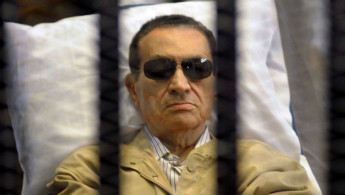Egyptian court orders Mubarak corruption retrial
Egypt's top appeals court has ordered the retrial of the deposed president Hosni Mubarak and his two sons in a corruption case, a decision that could lead to their freedom.
The Cairo court's decision overturned an earlier verdict which sentenced Mubarak to three years in jail, and his sons, Alaa and Gamal, to four years.
Mubarak's lawyer, Farid al-Deeb, however said that his client would remain in a military hospital for now on health grounds.
The corruption case is the only thing keeping Mubarak behind bars and Tuesday's decision allows for his release once a new court convenes in the retrial.
The former president was late last year cleared of ordering the deaths of protesters during the 2011 Egyptian revolution in which he was toppled, after a judge ruled that the charges were "inadmissible" on a technicality.
| We are not surprised by this verdict at all. - Freedom for the Brave campaign |
The judge in the case had described the revolution as part of an all alleged "American-Hebrew conspiracy" to undermine Arab countries for Israel's benefit.
"We are not surprised by this verdict at all," said a spokesman for al-Houriyah lil-Gidaan (Freedom for the Brave), a campaign calling for the release of the thousands of Egyptian political prisoners.
"Mubarak's rules and judges released him," he told al-Araby al-Jadeed.
The corruption case - known as the "presidential palaces" affair - is connected to charges that the Mubaraks embezzled millions of dollars of state funds over a decade toward the end of Mubarak's rule.
The funds were meant for renovating and maintaining presidential palaces but were instead spent on upgrading the family's private residences.
Mubarak and his sons were also fined the equivalent of $2.9m and ordered to reimburse $17.6m to the state treasury.
They returned the equivalent of about about $17m in the hope that the charges would be dropped.
Issandr el-Amrani, the North Africa director of the International Crisis Group think-tank, said the release of Mubarak was a "double-edged sword" for the current government President Abdel Fattah al-Sisi.
"On the one hand there is a group of Egyptians and Egypt's foreign backers in the Gulf who might welcome it," he said.
"On the other this regime, which is vulnerable to attacks that it is a continuation of the old regime, also has to keep in mind the symbolism of seeing Mubarak go free."





 Follow the Middle East's top stories in English at The New Arab on Google News
Follow the Middle East's top stories in English at The New Arab on Google News


